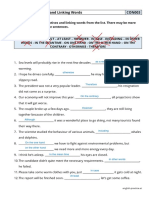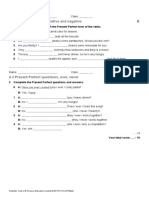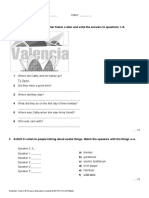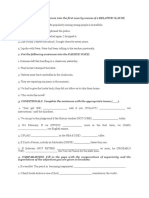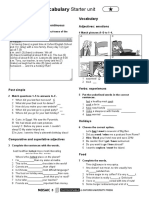Excerpt PDF
Excerpt PDF
Uploaded by
peienglishCopyright:
Available Formats
Excerpt PDF
Excerpt PDF
Uploaded by
peienglishOriginal Title
Copyright
Available Formats
Share this document
Did you find this document useful?
Is this content inappropriate?
Copyright:
Available Formats
Excerpt PDF
Excerpt PDF
Uploaded by
peienglishCopyright:
Available Formats
Cambridge University Press
978-1-108-64742-7 — Complete First for Schools Workbook without Answers with Audio Download
Natasha De Souza
Excerpt
More Information
A family
1 affair
Grammar
Present perfect simple
and continuous
1 Read this email and put the verbs in brackets into the most
appropriate form (present perfect simple or continuous).
To: Melissa
Hi Melissa,
How are things? Sorry it (1) has taken (take) me so long to get in touch. I (2) (think) about writing to
you for ages, but time (3) (fly) by since I (4) (be) in Italy. I (5) (stay) with my
sister in Padova, just near Venice. She (6) (study) at the university there and has just graduated. There
are lots of international students who go there, so she (7) (have) a great time meeting people from
around the world. I (8) (enjoy) staying with my sister this summer and I would even say the experience
(9) (make) us closer. Before going I was worried we might argue, but fortunately that (10)
(happen) at all!
We are staying with a local family and my sister and I look after the children when the family are out at work. I speak a bit
of Italian, but knowing the language isn’t essential as the family all speak English well.
Anyway, enough about me, how (11) (be)? I (12) (hear) you are staying at an activity camp.
How long (13) (do) that? It would be great to hear from you. I (14) (miss) our long chats.
Hope to hear from you soon!
Love Laura
Asking questions (present perfect simple and continuous)
2 A few days later, Laura replies to Melissa and asks her the following questions in her email. Use the prompts to write her
questions using the most appropriate form (present perfect simple or continuous) in the speech balloons.
1 how long / stay / with the family? 4 you visit / other parts of Italy yet?
How long have you been staying with the family?
2 Italian / improve a lot? 5 what / weather / like?
3 make / lots of new friends? 6 eat / lots of delicious ice cream?
© in this web service Cambridge University Press www.cambridge.org
Cambridge University Press
978-1-108-64742-7 — Complete First for Schools Workbook without Answers with Audio Download
Natasha De Souza
Excerpt
More Information
1
Vocabulary wear out take on clear up cheer up
tear up hang around with
Collocations with make and do
1 Last week we welcomed a new addition to our family and
Complete each of the sentences below with the correct
form of make or do.
(1) took on (accept responsibility) a puppy
called Toby. Having him around has had its advantages and
1 Before going to Italy, Melissa did a course in Italian. disadvantages, but for the most part I’ve really enjoyed it. On
2 In order to get pocket money the kids have to the plus side, he is great company and always manages to
jobs. (2) (make happy) when I come in
from school. Also, having him means I always have someone to
3 My parents get really mad if I a mess before
(3) (spend time with). He has a lot of
guests arrive.
energy, so I have to (4) (make tired)
4 My brother is dinner tonight, I hope it tastes OK! by taking him for regular walks. The only downside to having
5 I have a promise to my sister that I will always Toby, is that it is also a lot of hard work! Because he is still very
keep. young he sometimes tries to (5)
6 I can’t see you tonight. I’m something with my (destroy) the furniture and he makes a big mess, which I then
cousin. We are going to the cinema. have to (6) (tidy).
7 When we go to my aunt’s house we have to our
homework before dinner.
Writing Part 2
8 I have the decision to visit my grandmother
every weekend. An article
9 Because they are twins, I sometimes the
mistake of speaking to the wrong sister. Read part of an article written by a student for a magazine
10 My mum always her food shopping online. and correct the spelling and punctuation. There are 12
mistakes. The first one has been corrected for you.
Adjectives
2 For each of the sentences below, make an adjective Staying with your grandparents is great when you
from one of the words in the box. Some gaps need a growing
negative adjective. are growed up. When my brother and I visit are
grandparents they are always really pleased to see
relief think energy believe pride
entertain ambition us. My parents say we get spoilt when we stay there,
1 He was too proud to ask his parents for help. but they dont seem to mind to much. During the
2 She thought her brother’s show was very school holidays our grandparents always give us nice
. She hadn’t enjoyed herself so much for
a long time. things to eat, and sometimes its food we havent tryed
3 He was when his brother arrived home
safely. before. They also tell us a lot of intresting stories
4 He was very and was determined to do
about there past and things which happened before
better than his siblings.
5 He is so unlike his twin brother. It’s that we were born. The best stories are always about
they are even related.
6 She is a very child and always considers our parents’ and how they behaved when they were
how other people feel.
young. Our grandparents also do lots of enjoyable
7 Even though their grandmother is in her seventies, she
is still fairly and often goes to the gym. things with us, such as taking us to the beach or the
Phrasal verbs park. Last time we visited, we made cake’s and went
swimming. Even though they are in they’re seventies,
3 Complete each gap with a phrasal verb which means
the same as the word(s) in brackets. Use the verbs in the they are still very active!
box in their correct form.
A family affair 5
© in this web service Cambridge University Press www.cambridge.org
Cambridge University Press
978-1-108-64742-7 — Complete First for Schools Workbook without Answers with Audio Download
Natasha De Souza
Excerpt
More Information
1
Listening Part 3
Read A–H and listen carefully
to each speaker. The
words you hear will be
different from those
below.
02 You will hear five short extracts in which teenagers describe their favourite family holiday. For
questions 1–5, choose from the list (A–H) what each speaker says about the holiday. Use the letters
only once. There are three extra letters which you do not need to use.
A I regret arguing on holiday.
B I’m going to try to have the same experience but with different people. Speaker 1 1
C I felt more independent on this trip. Speaker 2 2
D I enjoyed the holiday because we stayed in a posh hotel.
Speaker 3 3
E I wish I had done more on this holiday.
F My enjoyment of this holiday largely relied on us having good weather. Speaker 4 4
G I am fortunate that this trip was captured on film. Speaker 5 5
H I didn’t enjoy the holiday when it rained.
Reading and Use of English Part 7
Read the questions, then quickly
read the texts. When you
You are going to read a newspaper article about being a twin. For questions find the part of a text which
1–10, choose from the people (A–E). The people may be chosen more than once. matches the question,
underline it.
Which person
appreciates the importance of twins needing to find their own way in life? 1
has mixed feelings about being looked after by their sibling? 2
feels angry when people assume that all twins look the same? 3
likes having conversations about being a twin? 4
didn’t like the way they were viewed as a twin child? 5
struggles when parted from their sibling? 6
realises that it is not only twins who sometimes argue? 7
no longer has a problem with being a twin? 8
shares their parents, view of being a twin? 9
has always felt fortunate to be a twin? 10
6
*sibling: a sister or brother
© in this web service Cambridge University Press www.cambridge.org
Cambridge University Press
978-1-108-64742-7 — Complete First for Schools Workbook without Answers with Audio Download
Natasha De Souza
Excerpt
More Information
The s co f ig n
A Sam Pearson, 13
People often ask: ‘What’s it like being a twin?’ To which I often
respond, ‘I don’t know. I have never been anything else!’ I never
mean to be rude; I am just being honest because since birth I have
never known anything different. I guess there are some advantages
though, for example, there is always someone to partner you in
class or hang around with at home. Also, when I meet new people
they always fi nd it really interesting to talk about what it must be
like being a twin.
B Julia Taylor, 30
I have always loved being a twin and I see being one as something
unique. There aren’t many people who have had this benefit and therefore I try to always focus on
the positives. This is something our mum and dad taught us when we were very young and I have
always remembered this. When we were growing up, one of the best things about being a twin was
our birthday parties! We had brilliant birthdays as kids. I am sure they were fairly stressful for our
parents, but we thought they were fabulous!
C Claire Kite, 16
People often presume when you are a twin that you must also be identical. This is not the case
however, and my twin brother is much taller than me; so sometimes people don’t believe we are
twins and I fi nd this really annoying! Being a twin has both its good and bad points. We fi ght a lot,
especially over gadgets, and when we were younger over toys or for the attention of our parents, but
I guess this is just like any other family. On the positive side, we often have a lot of fun together and I
never feel lonely. My brother is also very protective of me, especially at school, which is both a good
and bad thing!
D Mary Blackwell, 40
Growing up I had very mixed emotions about being a twin. I really hated it when people grouped us,
referring to us as ‘the twins’! We very much had our own identities and some people just failed to
recognise that. I used to constantly dye my hair different colours, just so I could look different to my
sister. Being seen as a unit rather than as an individual didn’t seem to bother my sister that much,
but for some reason it really affected me, especially as a teenager. Fortunately, we now have very
different lives, so it isn’t really an issue anymore.
E Helen Thompson, 19
I absolutely loved being a twin when I was growing up. I used to have a great time going out with my
sister. We are identical, so we always used to wear the same clothes and have the same haircuts.
We got so much attention when we went out and we were sometimes asked to pose for photographs.
We felt like celebrities! We were also very close when we were younger, and sure we would argue
sometimes, but most of the time we were best friends. This has all changed now though, as we have
each gone to a different university. I know it is a good idea that we each have our own independence,
but I do fi nd it hard sometimes and a bit lonely.
A family affair 7
© in this web service Cambridge University Press www.cambridge.org
You might also like
- CLIL World Natural Sciences - Student Book 4 - TOCDocument5 pagesCLIL World Natural Sciences - Student Book 4 - TOCElena García Morales0% (1)
- Board Game Past Simple Vs Past ContinuousDocument2 pagesBoard Game Past Simple Vs Past Continuouspeienglish100% (1)
- It Drives Me Crazy!: Solutions Third Edition Upper-IntermediateDocument2 pagesIt Drives Me Crazy!: Solutions Third Edition Upper-IntermediatepeienglishNo ratings yet
- Daily Routines and Time Boardgame Boardgames Games - 48298Document2 pagesDaily Routines and Time Boardgame Boardgames Games - 48298peienglishNo ratings yet
- Complete Key For Schools Unit Test 9 StandardDocument2 pagesComplete Key For Schools Unit Test 9 Standardmanuelitob911No ratings yet
- Exercises Scribd MarchhDocument1 pageExercises Scribd MarchhBeatrice ArboreNo ratings yet
- Con003 Connectives Linking WordsDocument2 pagesCon003 Connectives Linking WordsNatthaponNo ratings yet
- Optimise Your Grammar - B2: Reported SpeechDocument1 pageOptimise Your Grammar - B2: Reported SpeechLUISA CASTRO CUNEONo ratings yet
- RfB2F TG Unit 8 TestDocument10 pagesRfB2F TG Unit 8 TestCintia JaimezNo ratings yet
- Level 1 Grammar Extension 1 4Document1 pageLevel 1 Grammar Extension 1 4hector hernanaNo ratings yet
- COMPLETE EXAM Without Answers ADocument9 pagesCOMPLETE EXAM Without Answers Akaty galloNo ratings yet
- Test Unit 1: 6 Intermediate "B"Document5 pagesTest Unit 1: 6 Intermediate "B"sofía villegas100% (1)
- New Close UP B2 Test Unit 7Document7 pagesNew Close UP B2 Test Unit 7DeepualNo ratings yet
- Thk2e BrE L2 End of Term Standard Test 3Document4 pagesThk2e BrE L2 End of Term Standard Test 3Olha ChystiakovaNo ratings yet
- Bey B1 SBASDocument36 pagesBey B1 SBASJosé Muñoz0% (1)
- Unit 2 - Standard Test, CustomisableDocument7 pagesUnit 2 - Standard Test, CustomisableАнастасия ТанNo ratings yet
- Cambridge University Press 2017 Kid's Box BE Updated 2nd Ed. L6 Unit Tests Answer KeyDocument7 pagesCambridge University Press 2017 Kid's Box BE Updated 2nd Ed. L6 Unit Tests Answer KeyMoeNo ratings yet
- ANh 8 - Unit 1 (Test 15mins)Document2 pagesANh 8 - Unit 1 (Test 15mins)Nhung NguyễnNo ratings yet
- Answer Key Complete First Progress TestDocument14 pagesAnswer Key Complete First Progress Testcamila svendsenNo ratings yet
- English Writing Exercises For A2 A Holiday Blog English PracticeDocument1 pageEnglish Writing Exercises For A2 A Holiday Blog English Practicemarinka frizNo ratings yet
- B2 Unit Review and End of Year Test AudioscriptDocument10 pagesB2 Unit Review and End of Year Test AudioscriptSandra LazovskaNo ratings yet
- Complete The Sentences With The Correct Form of The Verb in BracketsDocument3 pagesComplete The Sentences With The Correct Form of The Verb in BracketsarioliNo ratings yet
- SSSG INGLESE Going To, Present Continuous For Future, Will Won't PDFDocument2 pagesSSSG INGLESE Going To, Present Continuous For Future, Will Won't PDFDavide G.2No ratings yet
- Go Getter 3 Grammar Check 6BDocument1 pageGo Getter 3 Grammar Check 6BАнна КозыреваNo ratings yet
- 07 GXP B2 Progress Test 07Document6 pages07 GXP B2 Progress Test 07gabrielaNo ratings yet
- COMPACT PFS TG Unit Test 01 PlusDocument1 pageCOMPACT PFS TG Unit Test 01 PlusVera DiaNo ratings yet
- RfC1A TG End-Of-Course Answer KeyDocument3 pagesRfC1A TG End-Of-Course Answer Keyqq867808106100% (1)
- Progress Test 10 U19-20Document1 pageProgress Test 10 U19-20Sinareet DadianiNo ratings yet
- English Download A2 Unit 6 Test: SuperfoodsDocument2 pagesEnglish Download A2 Unit 6 Test: SuperfoodsTadeo GarcíaNo ratings yet
- Practice TestDocument2 pagesPractice TestErika NordbyNo ratings yet
- GR MightDocument2 pagesGR Mightapi-304432259No ratings yet
- Unit 4 Test A: GrammarDocument4 pagesUnit 4 Test A: GrammarAstral mine RIP100% (1)
- Pet SB Prog Tests 4 6Document2 pagesPet SB Prog Tests 4 6GuillermoNo ratings yet
- Rephrasing Contrast PurposeDocument2 pagesRephrasing Contrast Purposeprobulina100% (1)
- FACE TO FACE PRE INTERMEDIATE - Unit 5 TestDocument3 pagesFACE TO FACE PRE INTERMEDIATE - Unit 5 TestSonia GarciaNo ratings yet
- Greetings From Italy Interactive Version Student ADocument1 pageGreetings From Italy Interactive Version Student AKarla RendonNo ratings yet
- UNIT 3: Skills Test B: Photocopiable © Pearson Education Limited 2019Document4 pagesUNIT 3: Skills Test B: Photocopiable © Pearson Education Limited 2019Eli Perez Alonso100% (1)
- Could, Was Were Able To, Managed ToDocument2 pagesCould, Was Were Able To, Managed ToRicardo Cantero Vigueras100% (1)
- Compact PFS TG Unit Test 1 - StandardDocument1 pageCompact PFS TG Unit Test 1 - StandardHuyền TrangNo ratings yet
- OPT B2 U06 Vocab StandardDocument1 pageOPT B2 U06 Vocab StandardPietro SembeniniNo ratings yet
- Journeys B2 Teacher's Resource Pack: Grammar ThemesDocument2 pagesJourneys B2 Teacher's Resource Pack: Grammar ThemesMiriam SanchezNo ratings yet
- RfB2F TG Unit 1 TestDocument8 pagesRfB2F TG Unit 1 TestSusana AzpeletaNo ratings yet
- OPT - B2 - T2M - Unit - 1 - worksheet - копия PDFDocument1 pageOPT - B2 - T2M - Unit - 1 - worksheet - копия PDFYOYO0% (1)
- A2 U6 Extra Grammar Practice Reinforcement PDFDocument1 pageA2 U6 Extra Grammar Practice Reinforcement PDFVick BastinNo ratings yet
- 9 Cu Sinif Sinaqlari - 4Document3 pages9 Cu Sinif Sinaqlari - 4Salam BratNo ratings yet
- Superlative Exercises PDFDocument2 pagesSuperlative Exercises PDFMontseNo ratings yet
- b1 Extra Vocabulary and Grammar Activities 0Document18 pagesb1 Extra Vocabulary and Grammar Activities 0Elena PopescuNo ratings yet
- A2 U4 Extra Grammar Practice Reinforcement PDFDocument1 pageA2 U4 Extra Grammar Practice Reinforcement PDFVick BastinNo ratings yet
- Journalism Course: Test 6Document3 pagesJournalism Course: Test 6Shabnam NajafzadehNo ratings yet
- Compact First For Schools Test Generator - Term Test 1 - (Plus)Document5 pagesCompact First For Schools Test Generator - Term Test 1 - (Plus)Shoto's girlNo ratings yet
- Possessive Case With GerundsDocument4 pagesPossessive Case With GerundsDavidNo ratings yet
- RfB2F TG Mid Course Test AudioscriptDocument5 pagesRfB2F TG Mid Course Test AudioscriptCoordenacao PvNo ratings yet
- Gateway A2 Review Test 1BDocument5 pagesGateway A2 Review Test 1BСвітлана Реган100% (1)
- Skills Test B: ListeningDocument4 pagesSkills Test B: ListeningMaxi ComasNo ratings yet
- Examen 1 Bach Recuperación InglésDocument4 pagesExamen 1 Bach Recuperación InglésAlejandroNo ratings yet
- Practice Tests+short Story (Teens 4)Document65 pagesPractice Tests+short Story (Teens 4)CLIC INGLÉSNo ratings yet
- Grammar Practice 2Document1 pageGrammar Practice 2franosullivanNo ratings yet
- Passive Voice Songs PDFDocument1 pagePassive Voice Songs PDFZyanyaHernandezPeredaNo ratings yet
- 3 - ESO Ingles MosaicDocument26 pages3 - ESO Ingles Mosaicmonicanaca100% (1)
- Compact Preliminary For Schools Workbook Without Answers With Audio CD Sample PagesDocument8 pagesCompact Preliminary For Schools Workbook Without Answers With Audio CD Sample PagesMolly0% (1)
- Complete First For Schools Second Edition Student S Book AGOSTO2021 15Document1 pageComplete First For Schools Second Edition Student S Book AGOSTO2021 15Rania AhmedNo ratings yet
- Excerpt PDFDocument8 pagesExcerpt PDFdivercelloNo ratings yet
- ინგლისური ენის პრაქტიკული კურსი III I შუალედური ვარიანტი I: ListeningDocument8 pagesინგლისური ენის პრაქტიკული კურსი III I შუალედური ვარიანტი I: Listeningnatia bazandarashviliNo ratings yet
- Toys Vocabulary Practicing - 38775Document2 pagesToys Vocabulary Practicing - 38775peienglishNo ratings yet
- Fruit Colouring WorksheetDocument1 pageFruit Colouring WorksheetpeienglishNo ratings yet
- Verb + PrepositionDocument2 pagesVerb + PrepositionpeienglishNo ratings yet
- Comparatives and Superlatives Fun Activities Games - 3546Document1 pageComparatives and Superlatives Fun Activities Games - 3546peienglishNo ratings yet
- Ludo Game - Irregular Verbs ReviewDocument1 pageLudo Game - Irregular Verbs ReviewpeienglishNo ratings yet
- Board Game Plural NounsDocument1 pageBoard Game Plural NounspeienglishNo ratings yet
- Comparatives and Superlatives - 37097Document2 pagesComparatives and Superlatives - 37097peienglishNo ratings yet
- John and Paul Go To SchoolDocument8 pagesJohn and Paul Go To SchoolpeienglishNo ratings yet
- Optimise Your Vocabulary - B1: IllnessDocument1 pageOptimise Your Vocabulary - B1: IllnesspeienglishNo ratings yet
- Present SimpleDocument1 pagePresent SimplepeienglishNo ratings yet
- Mosaic TRD2 GV U3 2Document4 pagesMosaic TRD2 GV U3 2peienglishNo ratings yet
- Board Game-AdjectivesDocument3 pagesBoard Game-AdjectivespeienglishNo ratings yet
- Daily Routines and Time Boardgame Boardgames Games - 48298Document2 pagesDaily Routines and Time Boardgame Boardgames Games - 48298peienglishNo ratings yet






